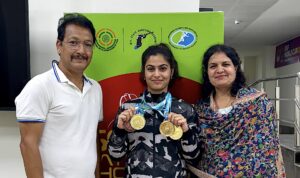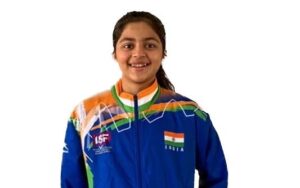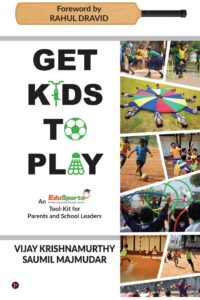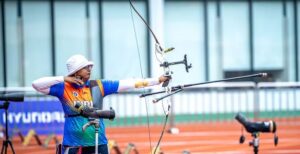It sounded like music to the ears when one of the world’s leading sports science experts, Genadijus Sokolovas, said in Bengaluru on Tuesday that many young Indian swimmers have the potential to each secure an A cut (Olympic Qualifying Time) for the 2024 Olympic Games if they (and their coaches) adopt the recommendations he has made after testing the athletes at the National Camp.
Having put close to 50 swimmers through a battery of tests – Swim Power Test, Start and Turn, and Lactate Test – and analysed their strokes in the minutest detail, Dr. Sokolovas said the Indians had a lot of potential to improve and stressed that efforts must be made to ensure that everyone learns to swim correctly and more efficiently.
“Of course, FINA (World Swimming Federation) adjusts the A cut for each Olympic Games. It is a moving target, and Indians must train smart to attain faster times,” he said. “We are learning all the time through research about development, recovery, physiology, nutrition and many other such linked areas.”
For the record, no Indian swimmer has secured the ‘A cut’. India has banked on Universality Places for its swimmers to gain Olympic experience.
The sports science expert, who studied in Lithuania and Russia, has worked with a number of Olympic champions, not the least being the most prolific Michael Phelps. He has served as the Director of Physiology and Director of Sports Science, USA Swimming and is a High Performance Director in USA Pentathlon.
Having got to the deck within hours of landing in Bengaluru on February 19, he has shown boundless energy each day. Besides conducting the tests, he has offered quality one to one feedback to the swimmers, leaving them with the belief that they can register significant improvement by incorporating some changes in their technique and training.
Talking to some reporters at the National Camp at the Padukone Dravid Centre of Excellence in Bengaluru, he said the first step should be to aim for the A cut, as the automatic Olympic Qualifying Time is called. “In a rapidly progressing and competitive sport, today’s B time (Olympic Selection Time) would have secured Olympic semifinal spot many years ago,” he said.
“I am sure the future generation of Indians can go faster,” he said, indicating that it was crucial for coaches to teach the young swimmers the right techniques, incorporating some of what he has recommended the coaches in the two-day workshop. Besides swimming techniques, Dr. Sokolavas shared his insight into training as well. “It is important as some drills can worsen techniques.”
Dr. Sokolovas said everyone has the potential to swim faster than one is doing at the moment. “The athletes have to learn to swim correctly, both under-water and on the surface. They can show major improvement with a better beginning of a stroke to avoid losing speed, by using their bodies more rather than seek power with their arms,” he said.
“The swimmers must not be blind to areas they can improve on. It is not only about working hard but also about understanding what needs working on,” the sports science expert said. “For instance, small changes in the flip cycle can help a swimmer make an improvement. And in our sport, sometimes five-hundredths of a second can make a big difference.”
Swimmers Kushagra Rawat and Srihari Nataraj, who were present at the media interaction, said they had learnt a lot from the testing and interaction with the sports science expert. “I learnt that I can make some corrections in my swimming and have determined that I will work on them. I could feel the change when I tried the flip that Dr. Sokolovas suggested,” Kushagra Rawat said.
Srihari Nataraj said that when when he was first shown an analysis of his swimming, he wondered if he even knew how to swim. “That is how much he (Dr. Sokolovas) could find out about the changes I could make. I tried making some of them and I felt a lot smoother and also in control. Just shows how much there is for us to work on and improve,” he said.
Dr. Sokolovas was pleased that while Indian coaches do not have access to advanced technology, the 30 coaches attending the two-day workshop have shown a hunger to learn. “They have been asking some good questions and I believe that with a good coach education programme, the young generation of swimmers will embrace good technique from the beginning,” he said.
Swimming Federation of India (SFI) Secretary Monal Chokshi said SFI had signed a Memorandum of Understanding with Dr. Sokolovas for a long-term partnership that would help India. “He will share his expertise in talent identification and development, shaping it in the Indian context. Our swimmers and coaches will have access to his vast knowledge,” Mr. Chokshi said.
Coming on the heels of its tie up first with Australian Wayne Goldsmith’s Moregold Performance Consulting and the partnership with Swimming South Africa, the access to Dr. Sokolovas’ testing techniques that had help Indians make progress, SFI has been making the right moves, even if it has not yet convinced all swimmers and coaches that it has thought of their long-term development.






